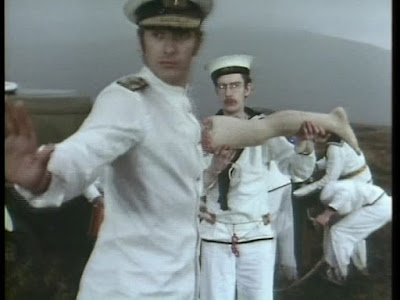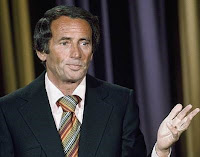So-- how'd Season 4 go? For those of you who need a refresher on where we are in the history of Monty Python's Flying Circus, check out this blog right here.
Well, the results were mixed. There were some brilliant bits, and an increasingly cinematic ambition very much in keeping with the era. New partnerships, with Neil Innes and Douglas Adams, seemed promising. But, without John Cleese on board, the commitment to comedy itself had waned.
 |
| Exception #2 |
At any rate, the 4th series/season, which didn't have the confidence of the BBC to begin with (as indicated by the truncated 6 episode commitment,) didn't renew the BBC's enthusiasm. In December, 1974, 5 years after they started revolutionizing television comedy, Monty Python's Flying Circus aired its final original episode. There were no reunion shows or reboots. It was over.
Wellllll... sort of.
 |
| Horse on horse action |
But while they were heading off in their own directions, a mighty gravitational pull began to exert itself-- an entity of such immense mass that it warped time itself, pulling the lads back into a single unit and transforming their futures so that they mirrored their past. Yes, I'm speaking of-- America.
Folks had been trying to get the word out about Monty Python for years. Remember, their first movie, "And Now For Something Completely Different" was initially intended to be the lads' entree into America, and America said "No, thanks." Albums had been released, to not very great acclaim. They had even swung through LA, on their rock n' roll tour of Canada, and had done a bit on the Tonight Show that had gone dismally. Former Rat-Packer Joey Bishop ("The Bishop!") was the guest host that night, introducing them with a lackluster "This is a comedy group from England and I hear they're supposed to be funny." Way to sell it, Bish.
All of this Yankee Doodle Indifference convinced the lads that America would never embrace them. As a result, they adopted a stand-offish attitude that worked so well for me with the middle school girls. "Fine, ignore me. Your loss" he said, trying to take out his head gear. Python refused to allow interested producers to convert the episodes from PAL format to the American NTSC "just to piss them off", according to Idle. ABC at one point wanted to broadcast episodes, only re-edited to make room for commercials and to make more linear and sensical. (Hah!) ABC had purchased the rights from the BBC, and Palin and the Pythons sued to get them back, refusing to let them air in any altered state.
But just as the cracks were beginning to show in the Python team, so were they becoming apparent in the U.S.'s resistance. Student studying abroad were coming back with the books or albums, and tales of the craziness playing out on the airwaves in Britain, in contrast to the states. FM stations were starting to play the albums. Julie Andrews, a huge fan, handed out books as Christmas gifts. Carl Reiner was a huge fan. Finally, in a burst of RatPack karma, Dean Martin featured some of the more filmic sketches from the first season on his 70s show, Dean Martin's ComedyWorld. This was my first introduction to Monty Python. I can remember, to this day, seeing the Milkman sketch, the Bicycle Repairman sketch, and a Day in the Life of a Stockbroker sketch. I was 10, and I loved it.
 |
| This never happened. |
It was only a matter of time before big government caught on.
When Republicans take the primary stage and talk about "firing Big Bird", aka defunding public television, they instantly lose my vote and my respect. If it hadn't been for public television, Monty Python never would have made it overseas. From Boston to Texas, PBS stations began showing the Flying Circus episodes, without commercial interruption, and the disease became a pandemic. When it was fundraising time at the stations, they would show Flying Circus marathons, sometimes even flying the lads in to answer the phones and do interviews. For the first time, Palin and Idle and Jones felt the love.
 |
| Money, Money, Money! |
And then... there was the movie.
Even before the fourth season had been shot and broadcast, Monty Python had sht their first feature length movie. Fearful that American audiences wouldn't take to it, Executive Producer John Goldstone was shocked to see lines for his movie going around the block at the LA Film Festival premiere. It's a nice analogy-- fearful that the crowds wouldn't show up, Goldstone discovered they were already there.
"The Holy Grail" is the Monty Python product that almost everyone knows. It has entertained generations of Americans, although that passion hasn't always translated over to the Flying Circus shows. While the UK generally prefers "The Life of Brian", empirically a better movie, "The Holy Grail" is just funnier, and America loves it above all else. It has secured a permanent place for the lads in the American entertainment firmament.
So it was the end of them as a television sketch show--but the show's corpse would provide decades and decades of sustenance as the lads gleefully fed off the remains. They did, indeed, have an eater here, and they were tucking in!
And although this blog is about the television show, we're going to break down the movie, so that everyone can see how the development of the artists during the TV show made "The Holy Grail" possible.
Next Time; The Holy Grail!
 |
| No More Cannibalism! |





Didn't Dean Martin include some filmed Python sketches on the Dean Martin show, replacing their narration with his own voice?
ReplyDelete